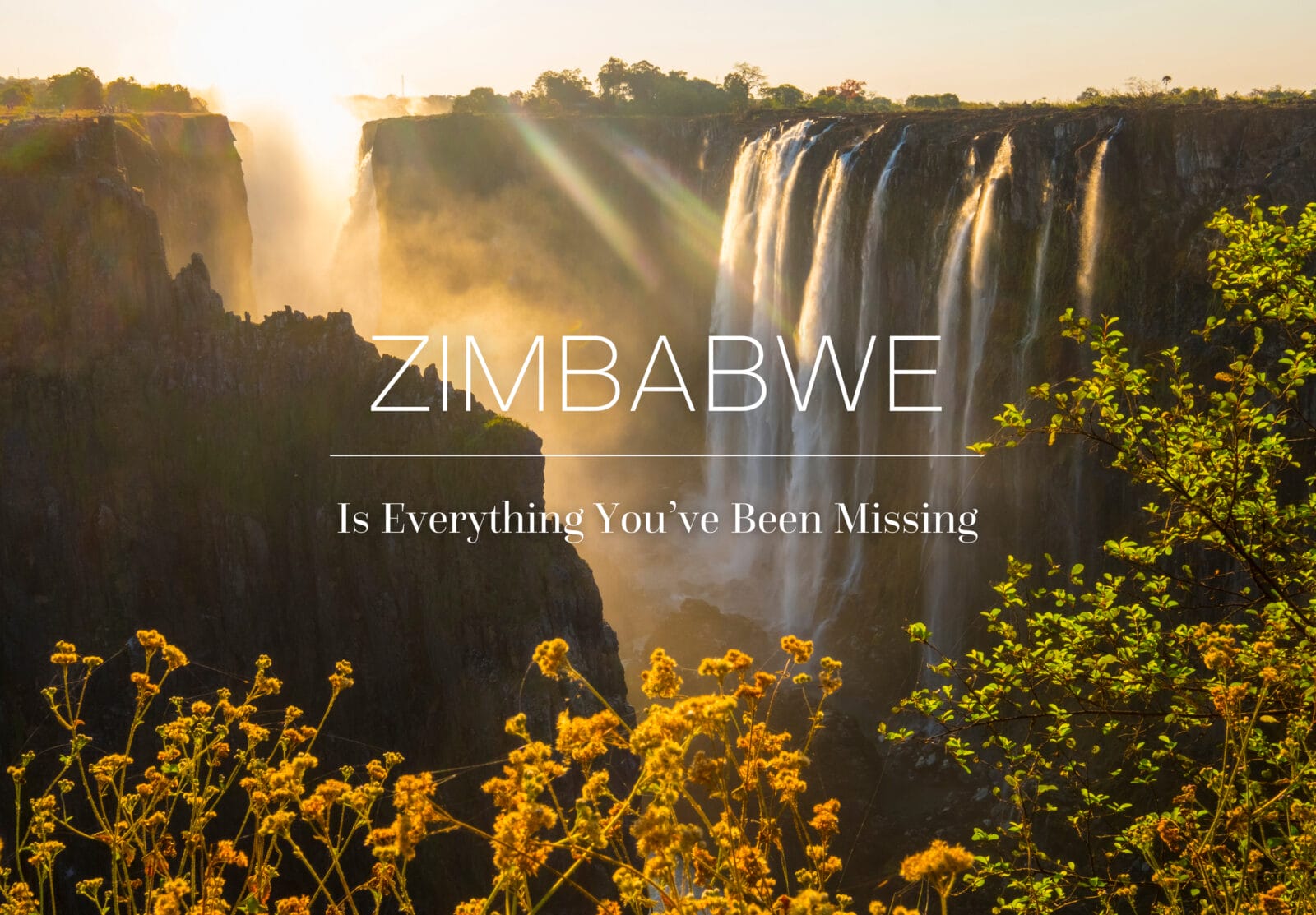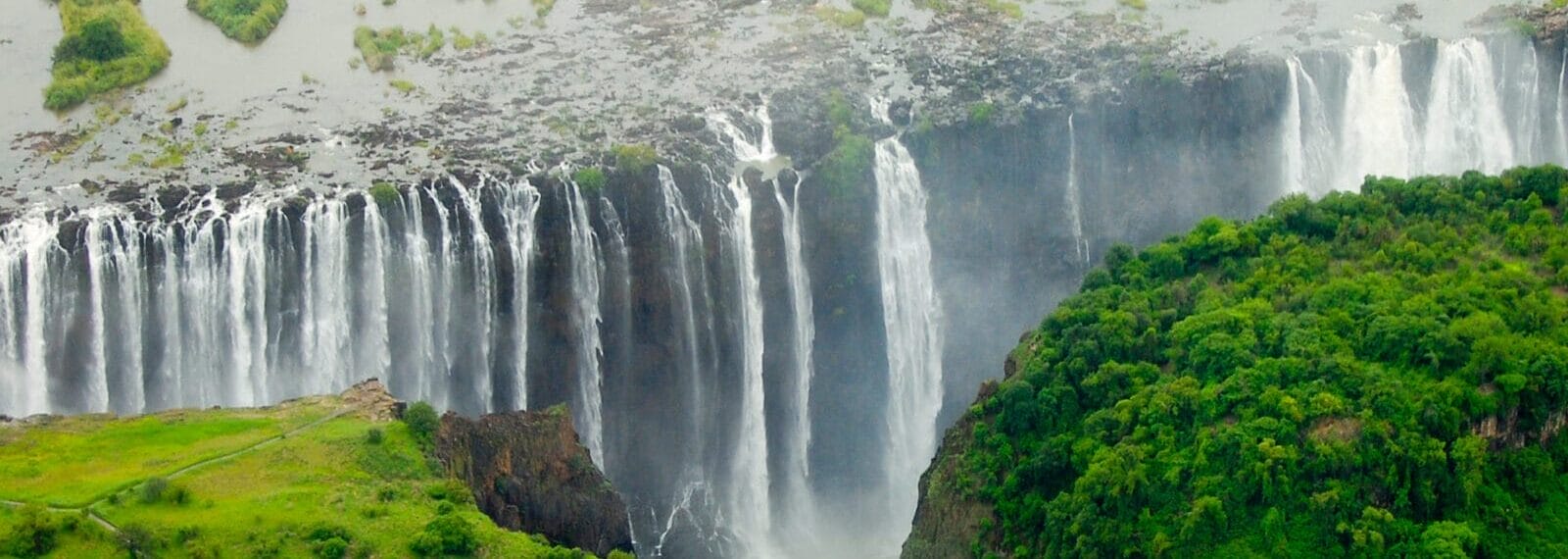
Zimbabwe Is Everything You’ve Been Missing
Posted on November 13, 2025, featured in Experiences
A Safari Journal by Chiedza
There’s a peculiar feeling that washes over you when the world finally sees what you’ve known all along. When Forbes named Zimbabwe the #1 destination for 2025 this August, I didn’t feel vindicated so much as I felt… relieved. Relieved that travelers might finally look beyond the headlines and see my country for what it truly is: a masterclass in wild authenticity, a landscape so raw and beautiful it makes your chest ache, and a people whose warmth is matched only by their resilience.
I’m Chiedza, and I’m a Travel Designer for Sikeleli. I had the privilege of experiencing Zimbabwe through the lens of African Bush Camps’ finest properties, a seven-day journey that reminded me why I became a travel designer in the first place.
Let me take you there.
The Numbers Tell Half the Story
Forbes’ announcement sent ripples through the travel world. Bulawayo saw an 80% surge in flight searches on Kayak. Harare bookings jumped 56%. Requests for Zimbabwe doubled overnight. Travel forums lit up with questions: “Is it safe?” “What’s the best time to go?” “How do I even begin to plan this?”
But here’s what those statistics won’t tell you: the way dawn breaks over Mana Pools, painting the Zambezi in shades of molten gold. The rumble of elephants so close to your tent you can hear their stomachs gurgling. The silence of the bush so profound it feels like a presence.
Victoria Falls: Where Everything Begins
I’ve started my journey in my hometown Victoria Falls but this time it felt different, perhaps because I knew I was about to see my country through the eyes of first-time visitors. Or perhaps because even after a lifetime of proximity, Mosi-oa-Tunya: The Smoke That Thunders, still has the power to humble me.
We stayed at Ilala Lodge, close enough to hear the falls from our rooms, that constant roar that becomes a kind of meditation. That first evening, I stood at the edge as mist rose from the gorge, catching sunlight in fleeting rainbows. Around me, tourists gasped and reached for their cameras. I stood there, Zimbabwean and silent, thinking: Yes. This. This is why you come.
The next morning, pilot Jeff flew us out in a small plane, and I pressed my face to the window like I was ten years old again. The Zambezi stretched below us, a silver ribbon cutting through wilderness, leading us toward Hwange.
Hwange: Where Elephants Own the Land
From the air, Hwange National Park looks infinite. Mopane and acacia stretch to every horizon, broken only by the occasional pan glinting in the sun. We touched down at Manga airstrip where Shepard from Somalisa Camp waited with that particular Zimbabwean welcome, genuine, warm, making you feel like family within minutes.
The drive to camp was already a game drive. Giraffe. Zebra. Kudu browsing in the shade. And then the elephants. Always the elephants. Their silhouettes against the setting sun looked like something from prehistory, reminders that this land belonged to them long before it belonged to us.
But nothing prepared me for arriving at Somalisa and seeing elephants drinking at the pool. Not near the pool. AT the pool. Casually. Three bulls and a matriarch, water dripping from their trunks, completely unbothered by our presence.
“They come every evening,” Richard explained during the camp tour. “We built around them, not the other way around.”
This is Somalisa’s philosophy: rustic luxury that doesn’t compete with the landscape but complements it. Canvas. Wood. The bush breathing all around you. My tent overlooked the waterhole, and I fell asleep that first night to the sound of elephants rumbling contentedly as they drank.
Our evening game drive with Shepard was masterclass in patience and knowledge. He spotted a pride of lionesses long before my untrained eyes could separate their tawny coats from the grass. We sat in silence, watching them watch us, the air thick with that particular tension that exists only when predators are near. Then the sun set, one of those Hwange sunsets where the sky turns molten and every acacia tree becomes a silhouette.
The next morning brought a gift. Painted dogs. At breakfast. They communicated in high-pitched calls, coordinating their hunt with intelligence that borders on uncanny. We watched, barely breathing, as they disappeared into the bush.
Somalisa’s manager, smiled as we all sat there, breakfast forgotten. “Welcome to Hwange,” she said. “Nothing here is guaranteed, but everything is possible.”
Mana Pools: Walking Among Giants
The flight from Hwange to Mana Pools took us over landscapes that shifted from dry woodland to the silver ribbon of the Zambezi. As we descended, I could see the floodplains stretching out, dotted with those iconic albida trees, flat-topped and ancient, offering shade to everything that passes beneath.
We landed at Zambezi Expeditions first, and our guide met us with news: Boswell had been spotted near camp.
For the uninitiated, Boswell is one of Mana Pools’ famous elephants, a gentle giant who’s learned that tourists aren’t threats. But knowing this intellectually and experiencing it physically are two entirely different things.
Our guide led us on foot toward where Boswell was browsing. On foot. Toward an elephant. Every instinct screamed at me to run, but I trusted my guide’s decades of experience reading these animals.
Boswell glanced at us, ears flapping lazily, and continued eating. We stood there, maybe fifteen meters away and I watched this massive bull elephant go about his day. His stomach rumbled. Branches cracked as he stripped bark. And I stood there, a travel writer who’s seen dozens of countries, with tears running down my face.
This is what Mana Pools offers: intimacy with wilderness that’s almost spiritual in its intensity.
Later, a pack of painted dogs trotted past us like we were just another part of the landscape. One youngster came close, curious, before his mother called him back. We spent an hour watching them playing, resting, establishing and not once did they seem threatened by our presence.
The move to Nyamatusi elevated everything. Perched right on the Zambezi, the camp blends luxury with wilderness so seamlessly you forget there’s a distinction. My tent had a view that stretched across the river into Zambia. At night, hippos grunted and snorted in the water below, their prehistoric sounds lulling me to sleep.
Our days became a rhythm: walking safaris at dawn, canoe trips on the Zambezi (elephants swimming! Crocodiles sunning themselves on banks!), and those magical moments when you realize you’re not just visiting the wilderness, you’re part of it.
The guides here are serious about their craft. They don’t just know the bush; they ARE the bush. They read tracks like you read books, spotting stories in the sand: when an elephant passed, whether it was stressed, where it was heading. One morning, we tracked a leopard for two hours before finding her lounging in an albida tree, tail flicking lazily as she surveyed her kingdom.
“This is why people come back to Mana Pools,” our guide said quietly. “Not just to see wildlife, but to understand it.”
Bumi Hills: A Different Kind of Serenity
The flight to Bumi Hills took us over Lake Kariba, that vast inland sea that looks almost surreal from above more ocean than lake, stretching to horizons that blur into haze.
Bumi Hills Safari Lodge perches on a plateau with views that make you forget you’re in Zimbabwe and think you’ve somehow entered a painting. Rufaro welcomed us with that efficiency mixed with warmth that’s become African Bush Camps’ signature, and Sydney gave us an orientation that was part logistics, part conservation lesson.
David Brightman, a head guide, spoke about the delicate balance here how Bumi Hills isn’t just a lodge but part of a larger conservation story connecting wildlife corridors and community development. This is safari with purpose, something increasingly important to conscious travelers.
That afternoon, we went out on Lady Jacqueline, the houseboat, for fishing. Surrounded by crocodiles (at a respectful distance), casting lines into water that held everything from tigerfish to the occasional hippo, I felt something shift. This wasn’t the dramatic, heart-pounding wildlife encounters of Hwange or Mana Pools. This was contemplative. Peaceful. A different face of Zimbabwe.
The infinity pool overlooks the lake, and I spent sunset there watching the water turn from blue to gold to deep purple. Chef Slim Shady (yes, that’s his actual name) created meals that somehow married gourmet cuisine with that unpretentious comfort Zimbabwe does so well.
Bumi Hills taught me that safari doesn’t always have to be about dramatic predator-prey interactions. Sometimes it’s about stillness. About watching fish eagles hunt. About understanding that conservation happens in quiet ways through community gardens, through teaching sustainable practices, through giving local people reasons to protect rather than exploit their natural heritage.
Why Zimbabwe, Why Now
There are no crowds here. At Somalisa, we might have seen one other vehicle all day. At Mana Pools, we walked for hours without encountering another soul. This isn’t just pleasant, it’s transformative. When you’re not jockeying for position with twelve other vehicles around a leopard sighting, you actually experience the moment. You hear the bushveld breathing. You notice the tiny things: dung beetles, birds, the way light falls through leaves.
The guides here are world-class. Zimbabwe’s Professional Guide training is legendary across Africa, and now I understand why. These aren’t people who memorized animal facts. They’re naturalists who’ve spent decades in the bush, who understand that guiding isn’t about spotting animals, it’s about translating the wilderness for people who speak a different language.
And let’s talk about value. Zimbabwe offers extraordinary experiences at prices 30-40% lower than comparable safaris in East Africa. This isn’t budget travel. This is smart luxury, better guiding, more exclusive properties, more personalized service.
An Invitation
Forbes named Zimbabwe #1, but here’s what their article couldn’t capture: the way your heart stops when you hear your first lion roar in the darkness. The absolute peace of sunrise over Lake Kariba from your private deck. The sound of hundreds of elephants
drinking at Somalisa as the sun dips below the horizon. The way light filters through albida trees at Mana Pools, casting dappled shadows that dance in the breeze.
This is my invitation: Come see my Zimbabwe. Come now, while you can still walk Mana Pools in solitude. While Somalisa’s waterhole still feels like your private viewing platform. While Zimbabwe remains this beautiful secret that’s just been discovered.
The world’s waking up to my country. I hope you’ll be among the first to experience why Forbes chose us. Not for the recognition, but for the moments that take your breath away and refuse to give it back.
Ready to experience Zimbabwe the way I did? Contact the team at Sikeleli Travel, we specialize in crafting authentic Zimbabwe experiences with the kind of insider knowledge that comes from living here.
Reach out to: Chiedza – chiedza@sikelelitravel.com
Travel Writer | Proud Zimbabwean / Travel Expert Sikeleli Travel







